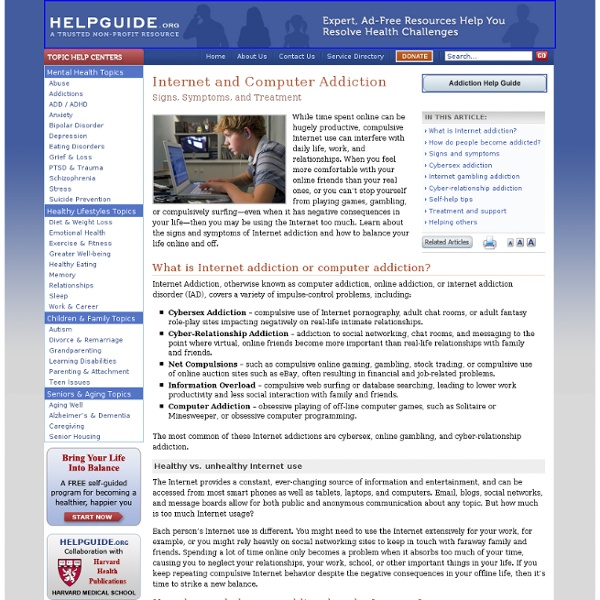Cyberpsychology, Behavior, and Social Networking
Editor-in-Chief: Brenda K. Wiederhold, PhD, MBA, BCB, BCN Latest Impact Factor* is 1.842 *2012 Journal Citation Reports® published by Thomson Reuters, 2013 Overview Cyberpsychology, Behavior, and Social Networking is the essential, peer-reviewed journal for understanding the social and psychological impact of today’s social networking practices. Cyberpsychology, Behavior, and Social Networking coverage includes: Social networking on Facebook, Twitter, YouTube, and moreVirtual communities and blogging behaviorMobile device behaviorComputer games and gaminge-Commerce and online shoppinge-Health communicationInternet addictionCyberbullyingEpidemiological studies of Internet use and behaviorAddiction to cyberpornCybertherapy and rehabilitation Cyberpsychology, Behavior, and Social Networking is under the editorial leadership of Editor-in-Chief Brenda K. Cyberpsychology, Behavior, and Social Networking is ranked 7 out of 67 in the "Communication" category of the JCR Social Sciences Edition
Internet addiction disorder
Internet addiction disorder (IAD), now more commonly called problematic Internet use (PIU)[1] or compulsive Internet use (CIU).[2] Other overlapping terms include Internet overuse, problematic computer use or pathological computer use – and even iDisorder.[3] These terms avoid the word addiction and are not limited to any single cause, but only reflect a general statement about excessive computer use that interferes with daily life.[4] IAD was originally proposed as a disorder in a satirical hoax by Ivan Goldberg, M.D., in 1995,[5] though some later researchers have taken his essay seriously. Other habits such as reading, playing computer games, or watching very large numbers of Internet videos or movies are all troubling only to the extent that these activities interfere with normal life. Internet addiction is a subset of a broader "technology addiction". §A multidimensional construct[edit] §Disputed disorder: DSM[edit] Jerald J. §Controversies in diagnosis[edit] §Net compulsions[edit] Dr.
Time to Unplug: ADHD and Computer Addiction | Live ADHD Free
We live in a world of constant stimulation and instant gratification. This is a problem that afflicts everyone, and every individual and family unit struggles with how to find a healthy balance. But this dependence on technology is more likely than ever to take on a destructive form for those with the ADD/ADHD brain type. The multitude of split-millisecond updates on blogs, social networks, apps, and news sites is like a Venus fly trap for rapid-fire thinkers. I am more convinced each day that excessive computer use can be a form of self-medication. Who Does This Sound Like? But these behaviors can become excessive, isolating and unhealthy when hours upon hours are spent in front of a computer. A Few Basic Steps If this sounds familiar, it’s probably the right time to kick the habit, even if just for a trial period. Log your hours. You will be amazed at how much time you waste on the computer and the benefits you get from staying off.
Internet Addiction Test
The Internet Addiction Test emerged as the first validated measure of Internet and technology addiction. The Internet Addiction suite of tests brings together the Internet Addiction Test (IAT) and the Internet Addiction Test for Families (IAT-F). The IAT is a self-report instrument for adolescents and adults. The IAT-F is for children and adolescents and completed by an informant who knows the youth well. Both instruments can be used together in assessment to obtain a well-rounded profile of the client’s Internet addiction and also to identify discrepancies amongst raters, who could benefit from psychoeducation. For more information on using the IAT and building an Internet Addiction treatment program in your practice, visit RestoreRecovery.net for our comprehensive workbook and training programs. To learn more about the validation studies of the Internet Addiction Test and for order information, please click here:
The association between attention deficit/hyperactivity disorder and internet addiction: a systematic review and meta-analysis | BMC Psychiatry | Full Text
Literature search Three hundred sixty studies were identified using the search strategy, including 2 from CENTRAL, 127 from EMBASE, 97 records from PubMed and 248 from PsychINFO (Fig. 1). After excluding 114 duplicated studies, a total of 360 articles were identified according to the present inclusion criteria. 29 potentially relevant studies were included in the systematic review and assessed by full-text. Among the remaining 29 articles, 3 case series were excluded, 4 studies were excluded because they were not associated with the relationship between IA and ADHD, 7 studies were removed because the outcome measures were unavailable. No additional studies were included through reference and bibliographic review. Finally, 15 studies were deemed eligible for the meta-analysis. Flow chart of literature selection Main characteristics of included studies Two cohort studies [16] and thirteen cross-sectional studies published from 2004 to 2016 were identified and included in our current study.




Ce site organisationel fait le tour de la question de l'addiction à l'internet ou à l'ordinateur à travers ses différents thèmes et ses liens vers des articles traitant de la prévention, des symptomes, et de l’aide à vaincre l’addiction. by couronne_groupe2_psy Apr 6